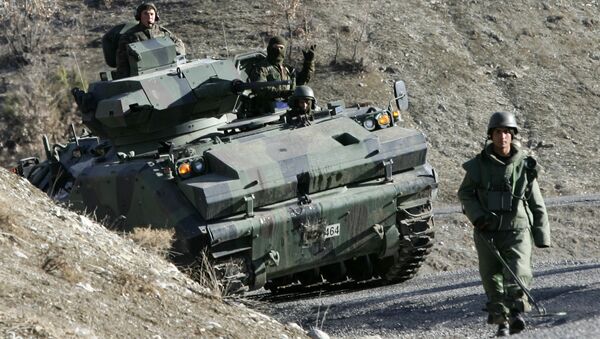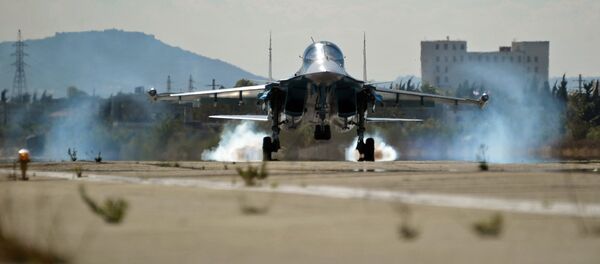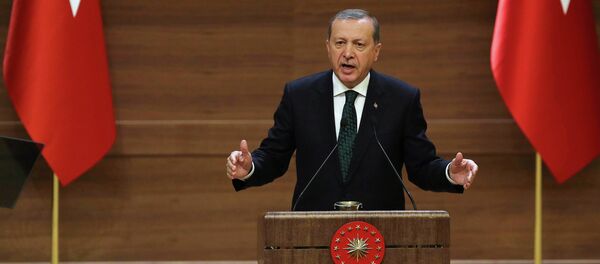Incredible as it may seem, Washington is about to kick off a third American military program aimed at training so-called "moderate rebels" inside Syria; the US authorities are currently considering Ankara's request to re-start the program.
"The real problem is, Turkey has never made any effort to secure its border, it is absolutely porous and terrorists are allowed to travel in and out of Turkey and have been since 2011. So this new policy is at worst to train Sunni fighters inside Syria, inside what they hope to become a safe zone. And what all this does is reinforce the status quo for Turkey. They don't have to change any of their behavior, and the problems will continue because of it," US investigative journalist and geopolitical analyst Patrick Henningsen said in an interview with RT.
Citing American lawyer and diplomat John R. Bolton, the analyst assumes that Ankara and Washington are seeking to create a sort of "Sunnistan" by seizing parts of Syria and Iraq.
"…defeating the Islamic State means restoring to power Mr. Assad in Syria and Iran's puppets in Iraq, that outcome is neither feasible nor desirable. Rather than striving to recreate the post-World War I map, Washington should recognize the new geopolitics. The best alternative to the Islamic State in northeastern Syria and western Iraq is a new, independent Sunni state," Bolton wrote in his November op-ed for The New York Times.
The diplomat elaborated that this "Sunnistan" may become both an oil producer and NATO's bulwark against Bashar al-Assad and Iran-allied Shiite Baghdad.
The idea to create "safe zones" for "rebel fighters" in Syria has also been voiced by the Brookings Institution, an influential Washington-based think tank, in June 30, 2015.
"The idea would be to help moderate elements establish reliable safe zones within Syria once they were able… Creation of these sanctuaries would produce autonomous zones that would never again have to face the prospect of rule by either Assad or ISIL (Daesh). They would also represent areas where humanitarian relief could be supplied, schools reopened, and larger opposition fighting forces recruited, trained, and based," Brookings defense research fellow Michael E. O'Hanlon wrote in his essay "Deconstructing Syria: A new strategy for America's most hopeless war."
Bangkok-based geopolitical analyst Tony Cartalucci has repeatedly called attention to the fact that both the "no-fly" zone initiative pushed ahead by Ankara and the Pentagon's "safe" or "buffer" zones project pursue one and the same goal — the balkanization of Syria and Iraq.
Apparently, the 'Sunnistan' concept has its origins in the US Defense Intelligence Agency's 2012 report. The document indicates that two years before the emergence of the uncontrollable terrorist group Daesh, Washington, Ankara and their Gulf allies harbored the creation of a "Salafist principality" in Syria in order to "isolate" Bashar al-Assad and curtail Iran and Iraq's Shiite "expansion."
"If the situation unravels, there is the possibility of establishing a declared or undeclared Salafist Principality in eastern Syria (Hasaka and Der Zor), and this is exactly what the supporting powers to the opposition (the West, the Gulf countries and Turkey) want, in order to isolate the Syrian regime, which is considered the strategic depth of the Shia expansion (Iraq and Iran)," the DIA report reads.
In mid-December 2015 US Secretary of State John Kerry repeatedly sent signals that Washington is not seeking regime change in Syria.
"They [the US government] are not softening their stance at all. What they are doing now is regrouping," Henningsen believes.
"So they are going to try to chip off a piece of Syria and a piece of northern Iraq to create this kind of canton, if you will, which will ultimately be completely dependent on those powers who created it. They decry the mapmaking exercises after WWI, but yet the same powers are involved in redrawing the maps again in further benefit for the next generation," the US political analyst stressed.




